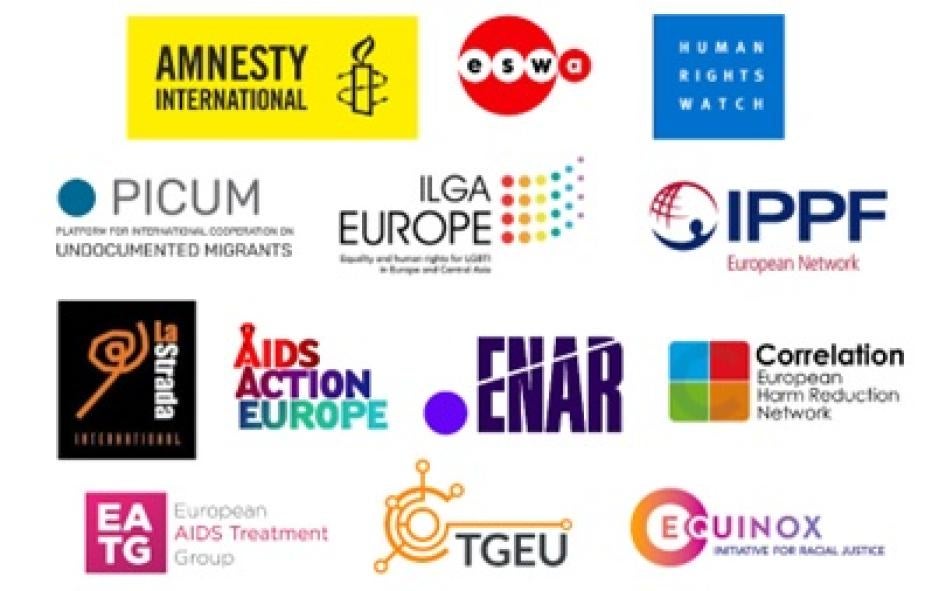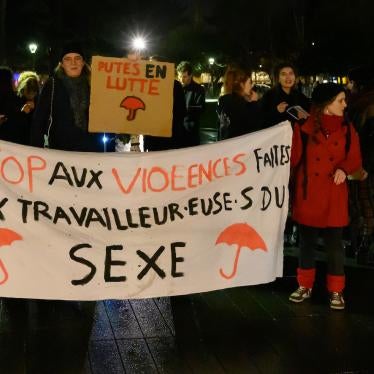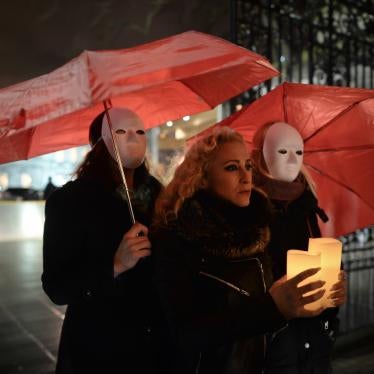We, the organisations united under the European Coalition on Sex Workers’ Rights and Inclusion, call on all Members of the European Parliament to reject and to vote against the report Regulation of prostitution in the EU: its cross-border implications and impact on gender equality and women’s rights, 2022/2139(INI).
Our organisations are leading civil society networks and human rights organisations. We have decades of experience and expertise in addressing women’s rights and gender equality, human rights, sexual and reproductive health and rights, HIV, harm reduction, the rights of LGBTI people, digital rights, human trafficking, migration, racial justice and criminal justice. Within these numerous fields of expertise, all 13 organisations have come to the same conclusion: criminalisation of any aspect of sex work, which is proposed by this report, does not protect the rights of women and others engaged in sex work for manifold reasons, and does not help address the very serious issue of human trafficking and forced labour. It is only by adopting a human rights-based approach, decriminalising all aspects of sex work, and meaningfully including sex workers and sex workers’ human rights defenders in decision-making, that people selling sex, including victims of sexual exploitation, can be protected and serious human rights violations against people selling sex experience can be addressed.
We consider the submitted report, which will be put to a vote in plenary on September 14, to be biased and harmful for people selling sex and other vulnerable groups for the following reasons:
- The report calls to punish sex workers’ clients (Para 9, 22, 38) and make it a criminal offence across the EU to solicit, accept or obtain a sexual act from a person in exchange for remuneration, the promise of remuneration, the provision of a benefit in kind or the promise of such a benefit (so-called Nordic model).
- While proposing the adoption of this model of criminalising the client (introduced, for example in Sweden, France, and the Republic of Ireland), the report ignores the body of evidence[1] on its negative impacts on human rights of people selling sex. Sex workers report increased precarity and vulnerabilities to violence and infectious diseases (including HIV) and reduced trust in authorities. Sex workers face increased stigma, barriers to accessing services and justice, and increased risks of homelessness in countries where such criminalisation is in force.
- This report ignores the fact that a similar provision is currently under review by the European Court of Human Rights for alleged violations of Articles 2, 3 and 8 of the European Convention on Human Rights in the case of M.A. and 261 others vs France[2]. On August 31 2023, without ruling on the merits at this stage, the Court declared the application admissible after acknowledging that the applicants were entitled to claim to be victims, within the meaning of Article 34 of the European Convention on Human Rights of the alleged violation of their rights under Articles 2, 3 and 8[3] and dismissed the Governments’ preliminary objections. The Court, in its decision acknowledges that "the applicants produce evidence tending to show that the clandestinity and isolation induced by this criminalisation increase the risks to which they are exposed" (Para 38).
- The report also denounces the effects of the legalised model (introduced in Germany, the Netherlands, Austria), but fails to consider the latest legal and policy developments such as the full decriminalisation of sex work in Belgium in 2022, which was adopted based on evidence, and recommendations of human rights organisations, UN agencies and meaningful consultation with sex workers, to better protect sex workers’ human rights and more effectively combat human trafficking.
- The report further misinterprets the findings of multiple health studies. The studies referenced[4] in Recital K directly contradict the call to punish clients and criminalise the purchase of sex. These calls are also opposed by numerous UN agencies, such as the Joint United Nations Programme on HIV/AIDS (UNAIDS)[5], the World Health Organization, the UN Population Fund (UNFPA), and the UN Development Program (UNDP).
- The report misinterprets the definition of trafficking in human beings as set out in Article 2 of Directive 2011/36/EU. According to the report, the "consent of a victim of trafficking in human beings to the exploitation, whether intended or actual, shall be irrelevant where it is obtained through the giving or receiving of payments or benefits". The quote, however, omits the second part of the sentence. The full text reads that the consent of the victim of trafficking is irrelevant “where it is obtained through the giving or receiving of payments or benefits to achieve the consent of a person having control over another person. In other words, for trafficking there must always be a third party involved who exercises one of the coercive or deceptive means for the purpose of exploiting that person. The exchange of sexual services (or any other service) between consenting adults is not trafficking. It becomes trafficking when, simply said, person A gives or receives payments or benefits to obtain the consent of person B who has control over victim C with the aim of exploiting victim C.
- The report makes further claims related to human trafficking which are not based on evidence. For example, it claims that trafficking for sexual exploitation is increasing when the latest available data[6] published by the European Commission actually show a slight decrease in the number of identified victims of trafficking for sexual exploitation in the EU. It also claims that countries which have criminalised the purchase of sex (such as Sweden, Ireland, and France) are “no longer big markets” for trafficking for sexual exploitation, when this is not the case - the Eurostat data[7], again, does not support such a conclusion.
- The report further denies a particular group of women (women who sell sex) their right to bodily autonomy (Paragraph 11, Recital C) by rendering void consent to sexual acts which involve payment or receipt of benefits. Criminalising the purchase of sex denies an entire group of people (most of whom are women) the right to make decisions about their lives. Similarly, the March 8 Principles by International Commission of Jurists (ICJ, 2023)[8] unequivocally opposed such criminalisation due to its detrimental effects on the human rights of people selling sex. This can lead to dangerous assumption that women who sell sex, in fact, cannot be raped.
- The report further calls for the introduction of criminal sanctions against anyone who profits from prostitution (Recital AK). This proposal fails to distinguish between conduct that is exploitative, abusive, or coercive, and activity that is personal, practical, and supportive or for the purposes of safety of people selling sex. This practice leads to the criminalisation of sex workers sharing premises for safety. It is also routinely used to evict people selling sex from their homes and apartments as landlords can be criminalised for ‘profiting from prostitution’. For some EU MS, like Portugal, the proposed definition has been recognized as unconstitutional[9].
In June, the prestigious health journal The Lancet[10] called on you to vote against this report as it is based on false or misleading information and would be harmful to the people it claims it wants to protect. Likewise, we, as feminists and women’s rights advocates, human rights defenders, service providers, researchers, and NGOs with decades-long experience, urge you to vote against the report “Regulation of prostitution in the EU: its cross-border implications and impact on gender equality and women’s rights, 2022/2139(INI).
Brussels, September 5, 2023
Signed by
Amnesty International
Equinox Initiative for Racial Justice
European AIDS Treatment Group
La Strada International
ENAR
The European region of the International Lesbian, Gay, Bisexual, Trans and Intersex Association (ILGA-Europe)
Transgender Europe (TGEU)
Human Rights Watch
International Planned Parenthood Federation - European Network (IPPF EN)
PICUM
Correlation-European Harm Reduction Network (C-EHRN)
ESWA
AIDS Action Europe
_______
[1] Ireland: “We live within a violent system.” Structural violence against sex workers in Ireland - Amnesty International (2022), W922-0152-WPS-Policy-Paper-6-singles.pdf (lse.ac.uk) (2022), What do sex workers think about the French Prostitution Act? (hal.science) (2019), Assessment of impact criminalisation of purchasing sexual services | Department of Justice (justice-ni.gov.uk) (2019), https://www.icj.org/icj-publishes-a-new-set-of-legal-principles-to-address-the-harmful-human-rights-impact-of-unjustified-criminalization-of-individuals-and-entire-communities/ (2023)
[2] See the preamble of the report: having regard to the ongoing communicated case 63664/19, 64450/19, 24387/20 et al. of the European Court of Human Rights of 12 April 2021, see also the case file: M. A. ET AUTRES c. FRANCE et 4 autres affaires (coe.int)
[3] See also the Court’s decision on admissibility M. A. AND OTHERS v. FRANCE (coe.int)
[4] Platt, L. et al., ‘Associations between sex work laws and sex workers’ health: a systematic review and meta-analysis of quantitative and qualitative studies’, PLOS Medicine, Vol. 15, No 12, 2018.,
Wong, S., ‘Decriminalising sex work would cut HIV infections by a third’, Imperial College London, 24 July 2014.
[8]https://www.icj.org/icj-publishes-a-new-set-of-legal-principles-to-address-the-harmful-human-rights-impact-of-unjustified-criminalization-of-individuals-and-entire-communities/
[9] Profit is not a criminal offence, judges have held that "a person's decision to engage in prostitution may constitute a full expression of his or her sexual freedom". And they argue that it is unconstitutional to punish with jail time those who profit from the prostitution of other persons practiced of their own volition. https://www.publico.pt/2023/05/09/sociedade/noticia/movimento-trabalhadores-sexo-elogia-decisao-tribunal-constitucional-2049084
[10] https://www.thelancet.com/journals/lancet/article/PIIS0140-6736(23)01179-0/fulltext









